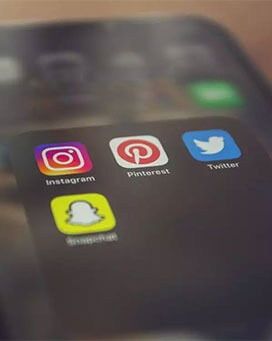
Over the course of the past year, ever since everything became virtual, social media became an integral part of our daily lives whether it was to stay connected & interact with people or for entertainment, to pass the time. It increased overall dependencies on social platforms to stay connected for work, education etc. During the pandemic, social distancing & multiple types of lockdowns were imposed in order to curb the spread of the virus which resulted in a surge of social media & internet usage since it became one of the key sources of information & entertainment alike. Social media has changed the way we communicate with each other and has become an easy & an effective channel for information dissemination & one of the primary sources of entertainment globally.
At a time like this, social media played a crucial role in quick access to reliable information whether it was about disease symptoms, prevention, coping mechanisms, online counselling services or finding resources online for covid affected patients with the help of one and another. Having said that, during this time, the need of the hour became to stay updated about everything related to Covid-19 and most of us also saw our own family members falling victim to the whole trend of forwarding whatever news that came their way irrespective of it being a reliable source of information.
Social media has proven to be both a blessing & a curse in this case considering it’s one of the most effective means of communication but can also easily lead to misinformation.
Here’s how content sharing was impacted by social media during the pandemic:
-Spreading information or misinformation? The choice is yours
Social media has been used as an effective tool of communication by news websites, organizations, health care workers/doctors and the general public to spread information about the pandemic. Although, the question of information reliability still remains pertinent considering sharing happens at the click of a button which helps the original content to get passed on further within no time. This is extremely helpful when you want to reach out to a larger audience, however, it’s important to verify the source of information at every given point, otherwise it could lead to inaccurate information shared with the same audience and there’s no control on how it’s perceived by the end user.
-Fighting the Covid-19 Infodemic
The Covid-19 Pandemic also witnessed a social media ‘Infodemic’ wherein we saw a rise in the fake news that was spread via multiple social media platforms which means most of the people’s understanding of the pandemic & the virus did not come from their own personal experiences but from what they read & understood through this fake news. This misinformation only caused further panic and affected the mental health and well being of the individual on the receiving end. Moreover, every individual is vulnerable to misinformation owing to their own beliefs, the level of education, culture & backgrounds. This led to the World Health Organization (WHO) becoming more active on social media ever since, to help combat the genuine problem of fake news and ensure that any “coronavirus” search including Google leads them to the WHO website only.
-How Social Media Influencers, Content Creators, Brands helped in tackling the Covid-19 Crisis
During the 2nd wave of Covid-19, it was like social media was reborn to help spread information whether it was combating oxygen shortage, finding plasma donors or finding a bed. We witnessed influencers, content creators, celebs & brands alike utilizing the reach of their follower base to amplify SOS calls of patients or their families & helping find resources for those in need. It did help to a large extent in gathering the resources as fast as possible, considering all of them served as credible sources. However, it also turned out to be a nightmare for the ones giving out their contact details online in search for whatever help they could find with them getting text messages from random people which may not have been the best experience for them.
It’s so important to understand the urgency of sharing the right information, on the right platform and most importantly from the right source to avoid falling prey to an infodemic. If someone’s sharing any unreliable information with you, double check the source & also urge them to verify the facts before they share it ahead to avoid any amplification of inaccurate information. So, to share or not isn’t the question if you ask me. To be alert and share responsibly is of significant importance here.
